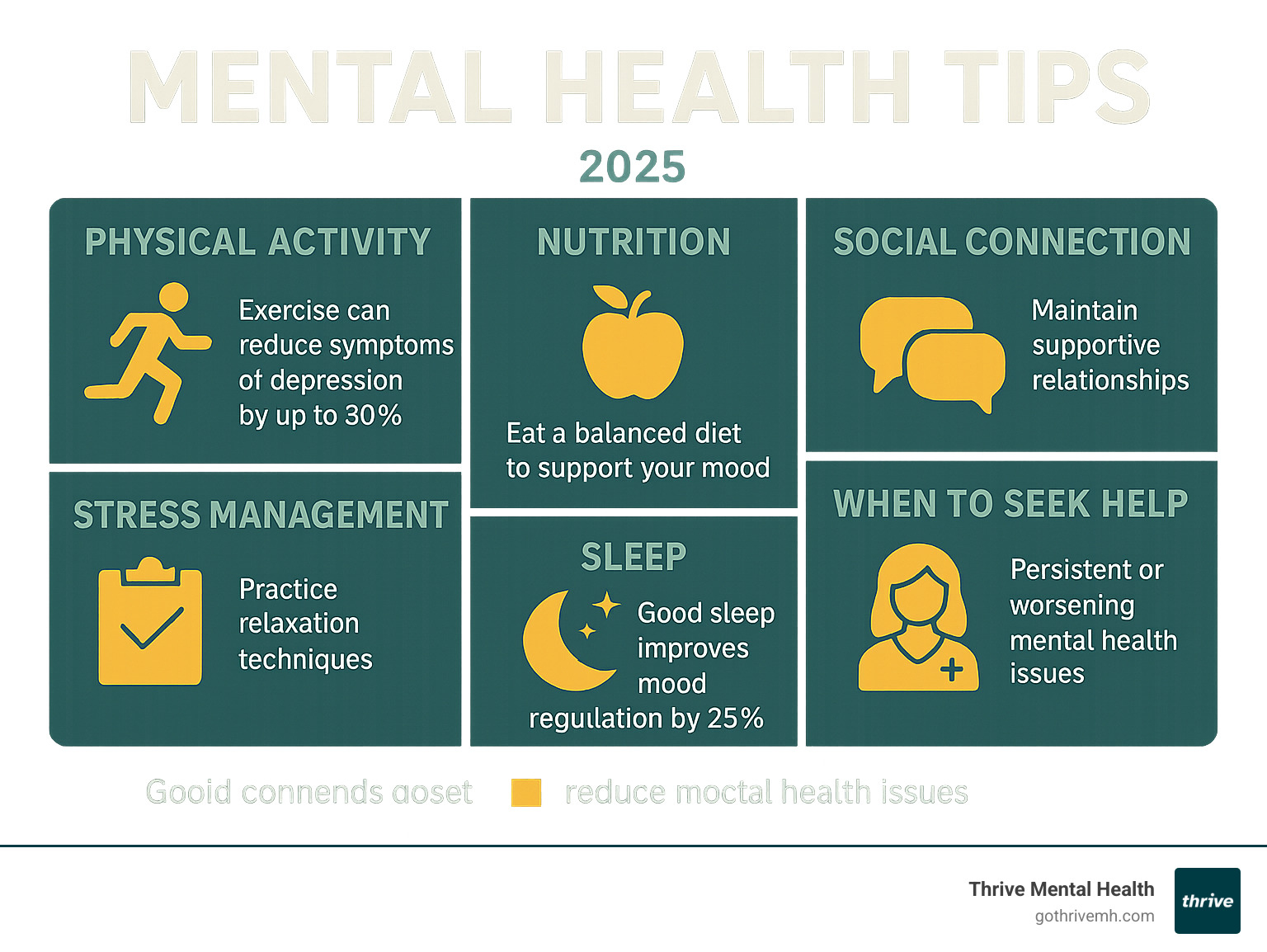Mind Matters: Practical Tips for a Healthier Mental State

Mental health tips: Thrive for a Healthier 2025
Why Mental Health Tips Matter for Your Daily Well-Being
Mental health tips are essential tools that can transform how you steer life’s challenges and boost your overall well-being. Whether you’re dealing with work stress, relationship issues, or simply want to feel more balanced, having practical strategies at your fingertips makes all the difference.
Quick Mental Health Tips for Immediate Relief:
- Move your body – Even a 10-minute walk can reduce stress and boost mood
- Practice deep breathing – Try 4-7-8 breathing when feeling overwhelmed
- Connect with others – Call a friend or family member for support
- Get outside – Spend 15 minutes in sunlight to stabilize your mood
- Challenge negative thoughts – Ask yourself if worries are realistic
- Practice gratitude – Write down three things you appreciate daily
- Maintain sleep hygiene – Go to bed and wake up at consistent times
- Set boundaries – Learn to say “no” to protect your energy
Mental health includes your emotional, psychological, and social well-being. It affects how you think, feel, and act in daily life. Good mental health isn’t just the absence of mental illness – it’s about feeling capable of handling stress, maintaining relationships, and finding meaning in your experiences.
The numbers tell an important story: one in five adults experiences a mental illness in any given year, and by age 40, one in two people have dealt with mental health challenges. This means you’re not alone if you’re struggling, and taking proactive steps to care for your mental health is both normal and necessary.
I’m Nate Raine, CEO of Thrive Mental Health, where I’ve dedicated my career to expanding access to evidence-based behavioral health care and developing innovative mental health tips that truly work in real-world settings. My experience leading healthcare innovation has shown me that the right strategies, applied consistently, can create profound changes in how people feel and function day-to-day.

Terms related to mental health tips:
Foundational Pillars for a Resilient Mind
Prioritizing our mental well-being is not a luxury; it’s a necessity. Just as we tend to our physical health, our minds require consistent care and attention. Building a strong mental foundation involves understanding and nurturing several key areas of our lives. Let’s explore the foundational pillars that support a healthier mental state.
The Powerful Link Between Physical Activity and Mental Health
It’s no secret that physical activity is great for our bodies, but its profound impact on our minds is often underestimated. Research consistently shows that being active significantly improves mental well-being. For example, a 2020 study revealed that going for a walk was UK adults’ favorite way of coping with stress during the pandemic. This isn’t just anecdotal; science backs it up.
Exercise is a fantastic stress reliever. When we move, our bodies release “feel-good” chemicals that can lift our mood, reduce muscle tension, and improve blood flow to the brain. Regular physical activity has been shown to reduce symptoms of many mental health conditions, including anxiety and mild depression. Even a brisk 30-minute walk each day can boost your mood and significantly improve your overall health.
Think about incorporating movement into your daily routine. This could be anything from a morning stroll on a beautiful Florida beach, to dancing in your living room, or finding a local fitness class that sparks joy. The best exercise is simply the one you enjoy and will stick with!

By integrating regular movement, we’re not just building stronger bodies; we’re actively nurturing our mental resilience. If you’re exploring comprehensive approaches to mental well-being, it’s worth understanding the benefits of professional treatment that can complement these lifestyle changes.
Fuel Your Brain: The Connection Between Diet, Sleep, and Well-Being
Our bodies and minds are intricately connected, and what we consume and how we rest play pivotal roles in our mental health. Each bite of food and sip of liquid affects our mental state, and these small effects accumulate over time.
A brain-healthy diet, rich in balanced meals, is crucial. Certain types of diets have even been shown to help manage depression. Think about incorporating foods like fatty fish, nuts, avocados, and dark leafy greens, which are packed with nutrients vital for brain function. Staying hydrated is also key, as water helps replenish brain cells and fight fatigue. Conversely, sugary and processed foods can lead to energy crashes and mood swings, making us feel tired and irritable.
Sleep hygiene is equally vital. Good-quality sleep rests the brain, repairs and replenishes brain cells, and significantly impacts our mood, decision-making, and social interactions. Adults generally need between 7 and 9 hours of sleep per night. To improve your sleep, aim for a consistent sleep schedule, even on weekends. Reduce blue light exposure from screens at least two hours before bedtime, and consider winding down with a relaxing activity like reading or listening to calming music.
Be mindful of caffeine and alcohol impact. While caffeine offers a temporary energy boost, it can also cause nervousness, irritability, or restlessness. Alcohol, though seemingly relaxing at first, can disrupt sleep and exacerbate mental health challenges. If you find yourself relying on these substances to cope, it might be a sign to explore healthier alternatives.
Building Resilience to Better Cope with Life’s Challenges
Life is full of ups and downs, and our ability to steer these challenges defines our resilience. Resilience isn’t about avoiding hardship; it’s about our capacity for adaptability, learning from experiences, and employing effective coping skills.
One of the most powerful mental health tips for building resilience is practicing positive self-talk and engaging in balanced thinking. Instead of dwelling on negative thoughts, we can challenge them. Ask yourself: Is this thought fair? Is it logical? Practicing healthier, more balanced thinking helps us respond to life events constructively, improving our confidence and self-esteem.
Practicing gratitude is another simple yet profound way to boost resilience. Regularly taking time to reflect on what we appreciate can foster more fulfilling relationships, improve sleep, and improve physical well-being. Keeping a gratitude journal, where you list a few things you’re thankful for each day, can be incredibly impactful.
Finally, don’t underestimate the power of a smile. Studies show that smiling is a mood booster that releases endorphins and cortisol, helping us feel better and even increasing our endurance. A little self-compassion, treating ourselves with the same kindness we’d offer a friend, also goes a long way in cultivating a resilient mind.
Actionable Mental Health Tips for Daily Life
It’s easy to feel overwhelmed by the idea of improving mental health, but many effective strategies can be woven into our daily lives. These actionable mental health tips don’t require grand gestures; often, small, consistent efforts yield the most significant results.
Cultivate Calm: Essential Mental Health Tips for Managing Stress
Stress is an inevitable part of modern life, but how we manage it makes all the difference. Cultivating calm through conscious practices is one of the most effective mental health tips we can offer.
Mindfulness involves paying more attention to the present moment, which can significantly improve our mental well-being. This means noticing our thoughts, feelings, bodily sensations, and the world around us without judgment. Mindfulness meditation, even for a few minutes daily, can reduce negative rumination and stress, leading to improved relationship satisfaction.
Beyond formal meditation, simple relaxation techniques can be incredibly effective. Deep breathing exercises, like the 4-7-8 method, can quickly calm the nervous system. Sensory grounding involves using your senses to bring you back to the present when feeling overwhelmed – think about using essential oils, a weighted blanket, or even a favorite plush toy. Taking a relaxing bath, perhaps with Epsom salts to restore magnesium levels, can also reduce stress and alleviate aches. For those seeking structured support in emotional regulation, exploring Dialectical Behavior Therapy (DBT) components can provide valuable tools.
Expand Your Horizons: The Joy of Learning and Hobbies
Our minds thrive on stimulation and growth. Engaging in activities that bring us pleasure and challenge us to grow are powerful mental health tips.
Learning new skills can significantly improve mental well-being. It boosts our self-confidence, raises self-esteem, and provides a sense of purpose. Whether it’s picking up a new language, mastering a recipe, or learning to play an instrument, the act of acquiring new knowledge or abilities can be incredibly rewarding.
Similarly, dedicating time to leisure activities and hobbies contributes immensely to our mental and emotional well-being. There’s a scientific link between hobbies and improved mental health. Focusing on things we’re interested in and that bring us pleasure can be a powerful form of stress reduction and a source of joy. Consider creative outlets like painting, gardening, writing, or playing music. These activities allow for self-expression and a healthy escape from daily pressures. For more structured creative exploration, you might consider the benefits of art therapy for adults.

The Power of Giving Back: Community, Purpose, and Connection
One of the most fulfilling mental health tips involves looking beyond ourselves and contributing to something larger. Finding purpose and meaning in life is a deeply human quality that significantly improves our mental health. This connection to something bigger can come from various sources, whether it’s a cause we care about, a spiritual practice, or simply the act of helping others.
Community involvement and volunteering are powerful ways to achieve this. Research shows that volunteering can improve both mental and physical health. The satisfaction of social connection and contributing to the well-being of others is invaluable. It can also provide an opportunity to practice gratitude, seeing the positive impact of our actions.
Even small acts of kindness can create positive feelings and a sense of reward, boosting our mental well-being. Holding a door open, offering a genuine compliment, or simply asking someone how they are and truly listening to the answer – these gestures not only brighten someone else’s day but also improve our own sense of purpose and connection.
The Social Fabric: Strengthening Connections for Well-Being
Humans are inherently social creatures, and our relationships form a crucial part of our mental health landscape. Nurturing these connections is one of the most impactful mental health tips we can accept.
Nurture Your Network: The Impact of Social Connections
Good relationships are paramount for our mental well-being. Healthy connections with friends, family, and co-workers are vital because they provide emotional support, help us steer tough times, build self-confidence, and reinforce that we are valued.
While technology allows us to stay connected, face-to-face connection remains incredibly powerful for stress-busting and mood-boosting. Even introverts need some degree of social interaction to maintain mental health. Studies on social relationships and health show that simply chatting with people occasionally can make a huge difference. These interactions foster a sense of belonging, allow us to share positive experiences, and provide mutual emotional support. Consider scheduling intentional time with people who genuinely lift your spirits and make you feel safe and supported.
Navigating External Stressors and Challenging Times
Life inevitably presents us with external stressors, whether they stem from work, relationships, or financial pressures. Knowing how to steer these challenges is a critical aspect of maintaining mental health.
Identifying stressors is the first step. Work stress, relationship issues, and financial strain are common culprits that can negatively impact our mental health. Signs that these factors might be taking a toll include difficulty sleeping, changes in appetite, persistent irritability, or a general sense of overwhelming pressure.
A key mental health tip here is setting boundaries. Learning to say “no” to commitments that overextend us, especially during demanding times like the holidays, is essential for protecting our energy. The holiday season, while joyous for many, can bring unique mental health challenges. Planning ahead, sticking to routines, setting boundaries, communicating our needs, and prioritizing support can help us cope. If large social gatherings feel draining, politely decline and suggest a smaller, more intimate get-together instead.

When facing specific challenges, like financial stress, seeking expert advice from charities offering free money management guidance can alleviate a significant burden. For young people navigating the complexities of adolescence and external pressures, exploring options like virtual counseling for teens can provide crucial support in building coping mechanisms.
Knowing When and How to Seek Professional Support
While self-care and lifestyle adjustments are powerful mental health tips, there are times when professional support becomes essential. Recognizing these moments and knowing how to access help is a sign of strength, not weakness.
Recognizing the Signs: When to Reach Out for Help
It’s important to understand when symptoms indicate a need for professional intervention. We should consider reaching out for help if we experience severe or distressing symptoms that persist for two weeks or more. These signs might include:
- Persistent difficulty sleeping or significant changes in sleep patterns.
- Noticeable changes in appetite or weight.
- Difficulty getting out of bed due to overwhelming mood.
- Trouble concentrating or making decisions.
- Loss of interest in activities previously enjoyed.
- Inability to complete usual tasks at work, school, or home.
- Chronic feelings of irritability, frustration, or restlessness.
- Thoughts of self-harm or suicide.
If you or someone you know is exhibiting these signs, especially those indicating severe distress, it’s crucial to seek help. For example, understanding PTSD symptoms can help identify when trauma might be impacting mental health.
Your Path to Healing: Exploring Professional Mental Health Tips and Therapies
Seeking professional help is a proactive step towards healing and improved well-being. Talking to a therapist or counselor can provide us with objective insights, coping strategies, and a safe space to process our emotions. It’s time we fully destigmatize therapy; it’s a valuable tool, backed by hundreds of studies demonstrating its effectiveness in improving quality of life and reducing symptoms of mental health challenges.
There are various types of therapy available, custom to different needs. For instance, Cognitive Behavioral Therapy (CBT) is highly effective in helping individuals identify and change negative thought patterns. Other approaches like EMDR (Eye Movement Desensitization and Reprocessing) can be beneficial for trauma. Online counseling services have also revolutionized access to care, offering a convenient and effective way to receive support from anywhere, including right here in Florida.
If you’re wondering how to find the right therapist for you, it often involves finding a good fit in terms of approach and personality. Our team at Thrive Mental Health is dedicated to connecting individuals with the right support, whether that’s through our virtual or in-person programs in Tampa Bay, St. Petersburg, or across Central Florida.
For immediate support during a crisis, please use these critical resources:
- 988 Suicide & Crisis Lifeline: Call or text 988 anytime, confidential and free.
- Crisis Text Line: Text HOME to 741741 from anywhere in the US, anytime, about any type of crisis.
- The National Alliance on Mental Illness (NAMI): Offers a helpline and resources at 1-800-950-NAMI (6264).
- SAMHSA National Helpline: 1-800-662-HELP (4357) for treatment referral and information.
Conclusion: Taking the Next Step on Your Mental Health Journey
We’ve explored a wide range of mental health tips, from the foundational pillars of physical activity, diet, and sleep, to the actionable steps of cultivating calm, pursuing hobbies, and giving back to our communities. We’ve emphasized the vital role of social connections and discussed strategies for navigating life’s inevitable stressors. Most importantly, we’ve highlighted the crucial importance of recognizing when to seek professional help and understanding the many paths to healing.
Self-care is not selfish; it’s essential. Every small, consistent step you take towards nurturing your mental well-being contributes to a healthier, more resilient you. You have the power to take control of your well-being, and you don’t have to do it alone.
At Thrive Mental Health, we are committed to providing expert-led, evidence-based care custom to your individual needs. Our virtual and in-person intensive outpatient (IOP) and partial hospitalization (PHP) programs are designed to offer flexible, accessible support, wherever you are in Florida. We believe that with the right strategies and compassionate guidance, everyone can achieve a healthier mental state.
Ready to take the next step towards a more balanced and fulfilling life? Explore our therapy programs to support your mental health and find how we can help you thrive.